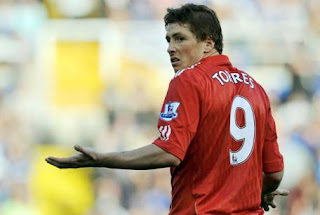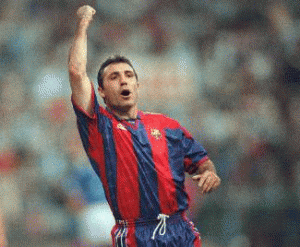Liverpool FC is closing in on the signature of the Ajax centre forward Luis Suarez. However, the signing immediately begs two questions:
1) Why sign Suarez when the rest of team needs undoubted strengthening? And maybe more importantly,
2) Does Suarez coming in speed up the departure of Fernando Torres?
Roy Hodgson was brought into the club last July by Christian Purslow and was immediately hailed as the man to steady the sinking ship, but the truth worked out far differently than either man could imagine.
His steady approach, after the scattershot transfer dealings of Rafael Benitez, was seen as the way to get the club back on track, as Martin Broughton sought a new owner, and although a top four finish was the very most Liverpool fans expected, a season of improvement on and off the pitch was the very least Hodgson had to produce.
Instead, Hodgson's campaign stuttered from the start and after just 31 games in charge of the Reds, as Liverpool slipped towards the relegation zone, with a record reading W-13 D-9 L-9 the likable manager found himself heading towards the growing dole queues in Croydon.
The ex-Reds boss' biggest mistake at Anfield was in alienating the Liverpool fan base and The Kop in particular. He had umpteen chances to stake his claim with the Anfield faithful but he bungled every single one.
From refusing to take Fabio Capello up with playing Steven Gerrard for 90 minutes when the Liverpool captain should have only played for 45 minutes while on England duty (Manchester United’s and Chelsea’s players only played for 45) to taking a diplomatic stance when Sir Alex Ferguson accused Fernando Torres of trying to get John O'Shea sent off, Hodgson just did not know how to act as a manager of a big club.
There is an old saying in the workplace. A man may have been working for 35 years but if he has done the same thing every year, then he doesn’t have 35 years worth of experience he just has one.
This would seem to be the case with Hodgson at Liverpool. He just seemed out of his depth and did not know what to do from day one.
After looking for the job last summer when he did not like any of the managers he was profiling, including Hodgson, Kenny Dalglish has been given the job to right the good ship Liverpool.
In just three games there has been enough improvement in the team to suggest that, instead of fighting it out in the lower reaches of the league, Liverpool could indeed mount a challenge to finish in the European spots.
The Scot has a tough task ahead, because there can be little doubt that the current squad needs improving.
There are glaring holes all over the first team squad. Quite simply there are far too many players not of Liverpool quality currently residing in red shirts and it says much that, for a long time, the two best players under Roy Hodgson were probably Sotirios Krygiakos and Lucas Leivia.
The ex-Fulham boss did not enamour himself to Liverpool fans with his summer signings or tactics but it must be said that the new additions were just like adding water to an already burning oil fire.
Now as we pass the halfway point of the season, NESV look set to prove to Liverpool fans that they mean business and that LFC is still a big club.
To send this message out to the fans, Damien Comolli has contacted Ajax about the availability of Luis Suarez.
Currently the negotiations between the two clubs are about £8 million apart, with Liverpool valuing the striker at around £15 million while Ajax want an estimated £23 million for the 23-year-old.
Suarez is one of the most sought-after players in world football at the moment. Barcelona and Manchester United both sent scouts to assess him last season when he bagged 49 goals in 48 games.
His overall record at Ajax is impressive. Over the last four years, he has never failed to score fewer than 20 goals a season, and his current record reads as having played 154 games with 110 goals.
Rumour of his impending transfer from Ajax went into overdrive two weeks ago when Ajax announced that Suarez was being removed as captain of the club and from there he has been linked with various clubs like Bayern Munich, Tottenham Hotspur, and Liverpool.
While there is no doubting his class or his potential, one must have to question the reasoning behind signing such a player for so much money, especially as the rest of the squad needs strengthening.
Stephen Warnock and Charlie Adam have both been linked with the club in recent days and would be welcome additions to the changing room, but that still leaves the glaring holes at centre half, central midfield, and out wide.
Of course, Liverpool definitely needs to sign a centre forward. Neglecting to bring in a player who could replace Fernando Torres was one of the prime reasons for both Rafael Benitez and Roy Hodgson getting sacked, but it seems madness to sign a player of £20 million type calibre unless he is going to play all the time.
The main problem there is that both Fernando Torres and Luis Suarez operate primarily as lone strikers for their respective teams.
Torres has been at Liverpool since 2007 and has never played with a real partner, unless you count Steven Gerrard playing just behind him.
Rafael Benitez is one of the most astute tactical managers in the game and even he failed to find a strike partner for the Liverpool No. 9.
Gerrard's best position is as the supporting midfielder, so if Suarez does come in, then Liverpool will gain in one area but lose in the other. Gerrard would revert to a traditional central midfielder when he simply does not know how to dictate a game from deep.
The other option for Liverpool on Suarez is to utilise him with Torres in the same way that Peter Beardsley complemented John Aldridge in Dalglish's first stint at Liverpool in the late '80s.
The problems with that particular tactic are that Torres' link up play is not up to the same class as his finishing and that he is a player who plays his best football when facing the goal rather than away from it.
It is also worth noting that John Aldridge was sold by Dalglish while he was still at his peak...
No, the Suarez signing only makes sense, to me anyway, on two levels.
1) He is a big-money signing that will get the fans back on board and,
2) His signing is the first part in Torres' future transfer.
It is no secret that Barcelona have indicated that they want to bring Torres and Fabregas back to Spain next season and Suarez's signing follows NESV's ideal by bringing in a player with vast potential while selling another at what could be his peak value.
If Suarez does indeed come in, he would be too valuable to leave on the bench so it would look as if Dalglish will be employing a 4-4-2 type system for the rest of the season with Steven Gerrard and possibly Charlie Adam as his two main central midfielders.
The problem with that set up is that it leaves the two centre halves exposed.
One would have to assume that since Martin Kelly is commanding the right full berth that Dalglish will stick with the youngster out there instead of the haphazard Glen Johnson, with Stephen Warnock coming in at left full.
That would leave Liverpool with a very one-paced back line and with a team whose tactical approach would be very direct, an accusation that the Kop levelled at Roy Hodgson with some venom on more than one occasion.
Is Suarez the right signing at the right time? Because it might even end up causing more questions than answers.































